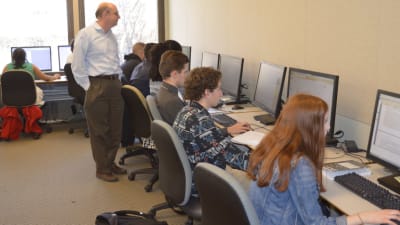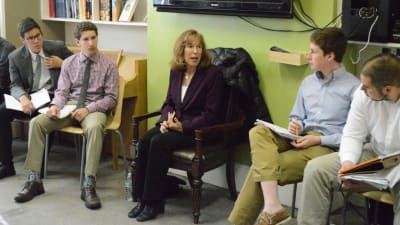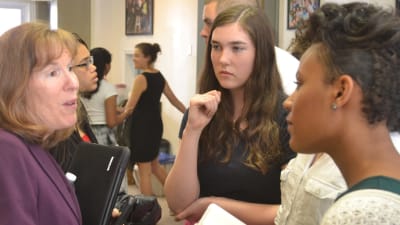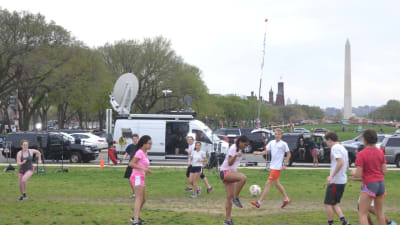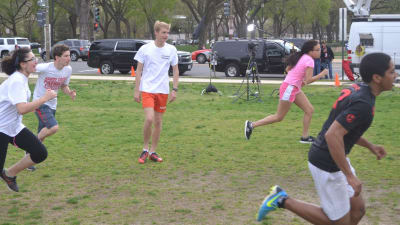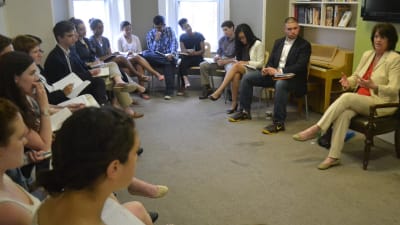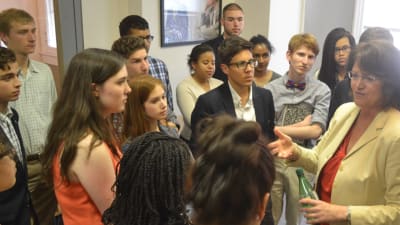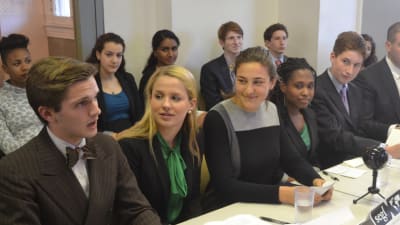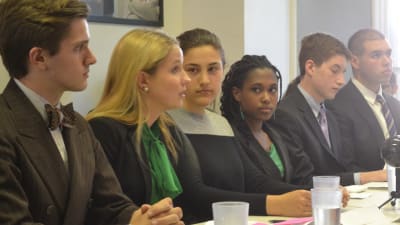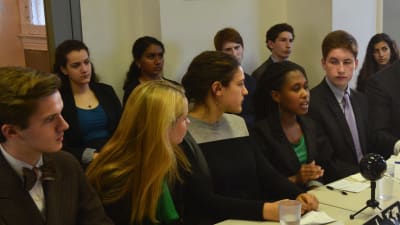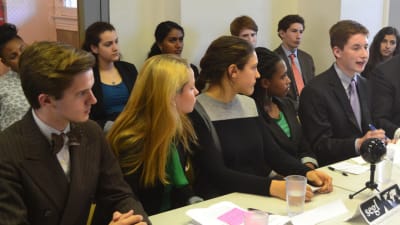Spring 2015 presents policy document to State Department; IOC leader
The capstone collaborative policy document is one of SEGL’s signature projects. Each semester of students must select an international ethical challenge to research and then prepare a 40-page scholarly document that proposes practical solutions to that challenge. Once the document is complete, the students present and defend the document’s recommendations before real-world leaders. All in about three weeks while also continuing with regular classes.
Sound like fun? It is!
Spring 2015 chose to focus on human rights at international sporting events. Many believe FIFA (the international soccer federation responsible for the World Cup) and the International Olympics Committee neglect long-term concerns in favor of short-term benefits. It turned out to be an extraordinary topic that brought together a remarkably complex set of questions.
After making this decision, the students split into six groups, each of which focused on a different aspect of the paper: History/Current Status, Housing Issues, Labor Issues, Development Issues, Freedom of Speech Issues, and Enforcement.
The groups then spent a day in the George Washington University main library with full access to the University’s resources. David Ettinger, a top research librarian at GW who has become a student favorite since our first semester, started with an entertaining orientation session so that the students could master how to use the myriad databases in the GW system, and then the students holed up in the many corners of the building.
After compiling their research for several days, the students appeared before the notorious “Review Panel” (ask a current student or graduate what the unofficial name for this is!), a faculty firing line that blisters the students with tough questions designed to ensure their research is consistent, logical, and well-sourced. (This proves especially useful when the students later present to high-ranking officials.)
The next step was rough drafts (each read by two faculty members), revisions, and additional research. This additional research often included personal interviews with experts. In fact, we had two visit to help the students along.
First, we met with Dr. Lisa Delpy Neirotti, Director of the Masters in Tourism Administration program at George Washington University and one of the world’s foremost experts on the Olympics and the World Cup. Dr. Neirotti, a pioneer in the world of sports tourism, was instrumental in helping the students understand some of the complex challenges that FIFA and the IOC face. For example, why should a sports organization be able to judge human rights issues? What might happen to these events if predominantly Western countries began imposing their values on Eastern or developing countries? Wouldn’t chaos result if athletes used these games as platforms for their political beliefs?
Second, we met with USA Today sports columnist Christine Brennan. Brennan, who has covered the past 16 Olympic Games, was also the first woman sports reporter at the Miami Herald and the first female staff writer to cover the Washington NFL team (she won’t say the team’s name!). She took a far less sympathetic tack than Dr. Neirotti, urging the students to hold FIFA and the IOC accountable for ensuring ethical behavior by host cities and countries. (One notable moment: when a student mentioned the 1400 construction deaths so far as a result of the Qatar World Cup preparations, Brennan expressed surprise and said she would consider using that statistic in a future column. Of course, the student followed up by email with a citation…)
And then, before we knew it, it was time to present. Each semester we try to meet with on-the-ground policymakers who have the ability to incorporate our students’ ideas into actual policy.
This semester we made two presentations. The first took us to the State Department, where we met with Deputy Assistant Secretary of State for Democracy, Human Rights and Labor Scott Busby, along with his colleague Sarah Brooks (who recently helped the State Department wrestle with the controversial Qatar World Cup preparations). Busby and Brooks were grateful for the information the students shared (Busby said the State Department should consider paying more attention to this issue) and pressed the students to make their recommendations more practical: how could leaders convincingly implement positive change?
On Friday, the students met via videoconference with Anita DeFrantz, a former Olympian rower and a current member of the International Olympic Committee’s Executive Board. (She is also a past Vice President of the IOC and a current board member of the U.S. Olympic Committee.) DeFrantz, a bona fide USOC and IOC legend, challenged the students with real-world questions (for example, “How can I tell other countries to promote human rights when the U.S. is one of the only countries not to sign on to at least seven international human rights treaties?”) before lauding their strong arguments and defense of their recommendations. It was a fitting end to a meaningful and challenging project.
With all this research, did we have any fun in the past few weeks? Absolutely. One of this semester’s favorite pastimes is playing soccer on the National Mall–see below for pictures!
Want to see the document for yourself? You can download it here.


